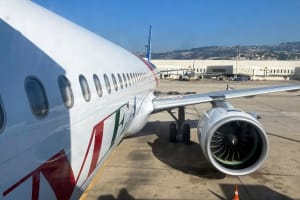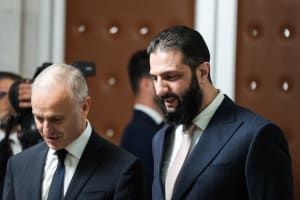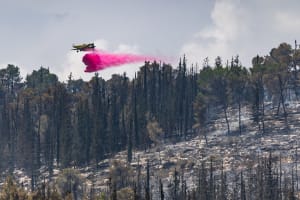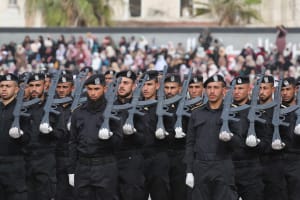‘Hezbollah is a cancer’: Lebanon struggles to free itself from terror group’s grip
US envoy Ortagus encourages financial reforms and Hezbollah disarmament

With the tense ceasefire between Israel and Hezbollah seemingly holding for now, the country’s new government continues to declare its intentions of disarming the terror group, freeing the country from the decades-long grip of Hezbollah and its Iranian patrons.
During her recent visit to Beirut, U.S. Deputy Special Envoy for the Middle East, Morgan Ortagus, reiterated the American support for disarming the group, which it called a “cancer” and blamed it for the war with Israel.
“When you have cancer, you don’t treat part of the cancer in your body and let the rest of it grow and fester,” Ortagus said in an interview with Al Arabiya on Monday. “You cut the cancer out.”
“The government of Lebanon didn’t want to go to war with Israel. It was on October 8, 2023, that Hezbollah and Iran decided to get into the war… people were forced into a war that nobody wanted to be in.”
The new government led by President Joseph Aoun and Prime Minister Nawaf Salam, has “a once-in-a-generation” opportunity for much-needed reform, Ortagus said, particularly highlighting the severe financial crisis.
“Lebanon’s financial situation is as bad as it gets. They’re in a hole. It’s worse than Greece during the financial crisis.”
President Aoun declared on Monday that Lebanon is committed both to reforms as well as to Hezbollah’s disarmament, but also reiterated his diplomatic approach, which has caused concerns that the heavily armed terror group could try to play for time without agreeing to disarmament in the end.
الاجتماع بين رئيس الجمهورية العماد جوزاف عون ونائبة المبعوث الأميركي إلى الشرق الأوسط مورغان أورتاغوس، كان بنّاءً، وتم البحث بين الوفدين، في عدد من الملفات، أبرزها:
— Lebanese Presidency (@LBpresidency) April 5, 2025
- الوضع في الجنوب اللبناني
- الحدود اللبنانية-السورية
- الإصلاحات المالية والاقتصادية لمكافحة الفساد
وكان قد سبق… pic.twitter.com/Yksmfu5Rj6
“Lebanon needs time and space to resolve these matters calmly,” Aoun said, “Hezbollah after all is a Lebanese component and the Israeli occupation of the five hills (in south Lebanon) would not help Lebanon but only complicate the situation further.”
According to Naharnet, Aoun, Salam, and Parliament Speaker and Shia leader Nabih Berri told Ortagus they are committed to bringing all armed factions under government control, and extending the state’s authority to all of its territory.
For now, Hezbollah’s forces, which are larger, better equipped and more experienced than the state military, control large areas of the country, including the Dahiyeh neighborhood and the nearby only international airport in Beirut.
As part of a broader move to emancipate the state from the terror group, the government is considering repurposing a military airfield in northern Lebanon to build a second international airport, far from Hezbollah control, according to Ynet News.
Prime Minister Salam visited Kleiate Airport last month and announced it would resume commercial operations within a year.
Meanwhile, the state also attempts to regain control over the Beirut airport. Asharq Al-Awsat reported that several work permits for employees linked to Hezbollah were recently canceled, following the dismissal of the allegedly corrupt and Hezbollah-linked head of the civil aviation authority.
In addition, Transport Minister Fayez Rasamny reiterated that the ban on flights from Iran, which were often used to resupply Hezbollah, remains in effect.
During the talks with Ortagus, Aoun, Salam and Berri told the U.S. envoy that they intended to reach agreements with the terror group to receive its weapons.
“They told her that the exclusivity of arms has become indisputable, undebatable and settled and that only the timing remains for removing illegal weapons,” sources told Asharq al-Awsat.
The sources added that “there is constant communication between the leaderships of the army and Hezbollah, with its agenda topped by preparing for the phase of the gradual absorption of Hezbollah’s arms on the basis of commitment to the implementation of 1701 as stipulated by the Taif Agreement, which enjoys support for Hezbollah in the vein of its backing of the resolution related to extending the state’s authority across its territory.”
Ortagus meanwhile reportedly promised that Washington would continue its support of the Lebanese Army and vowed to supply new military helicopters soon.
Despite the positive developments for Israel, the Lebanese Parliament Speaker Berri, who represented Hezbollah in the ceasefire talks, declared that normalization with Israel was not on the table.
He again accused Israel of violating the ceasefire and UN Resolution 1701, and decried that the IDF continues to hold five strategic posts in south Lebanon.
According to al-Joumhouria, Berri said, “The Israelis themselves have not raised the issue, so why are some of us rushing into normalization?”
“Normalizing ties with Israel is unacceptable and unthinkable.”

The All Israel News Staff is a team of journalists in Israel.
You might also like to read this:
















